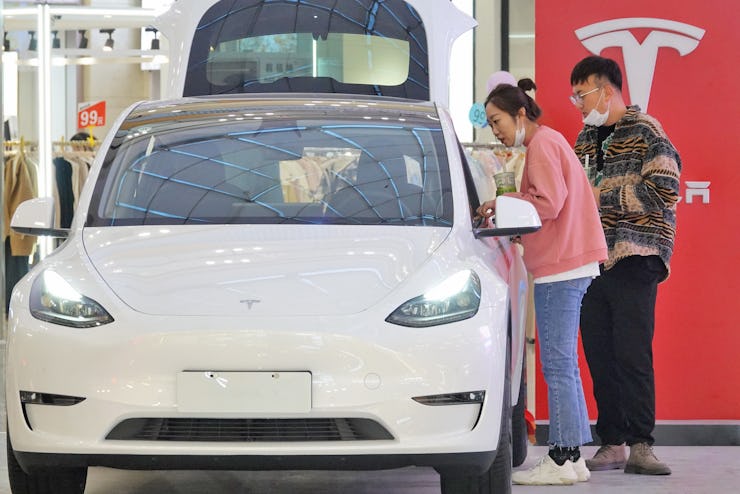Tesla’s Camera Scandal Is a Wake-Up Call for Stronger In-Car Privacy
Tesla employees reportedly had access to private, and sometimes embarrassing footage, recorded on the company's cars.

The built-in cameras in Tesla’s cars can see more than just obstacles on the road. Tesla employees saw and exchanged private photos and videos recorded on Teslas without owners' knowledge, according to an extensive report from Reuters.
Employees viewed the footage as part of Tesla’s effort to develop its self-driving Autopilot feature. While technically anonymized and noted in the electric car company’s Customer Privacy Notice, it’s hard to see someone’s garage and not learn something personal about them, you know? Despite marketing press releases’ efforts to sell them as some home-away-from-home or mobile office, cars are not private, and making them high-tech and self-driving like a Tesla doesn’t seem to be changing that for the better.
Tesla Vision
Tesla’s cars rely on cameras for all of their “smart” features.
According to the more than one dozen Tesla employees Reuters spoke to, employees saw road-rage incidents, crashes, and even potentially embarrassing footage. “One ex-employee described a video of a man approaching a vehicle completely naked,” Reuters writes. Tesla even used to capture footage when cars were off if customers agreed to it, though the company has since removed that option. “We could see inside people's garages and their private properties,” one employee told Reuters. “Let's say that a Tesla customer had something in their garage that was distinctive, you know, people would post those kinds of things.”
In 2021, Tesla decided to pivot its self-driving efforts so that cars relied exclusively on cameras to stay in road lines, identify obstacles, and drive on their own rather than radar or some combination of the two. If you’ve kept on top of Tesla news, you may be aware that the shift to “Tesla Vision” has produced mixed results, but it’s also one of the reasons footage from cars has to be reviewed so extensively in the first place. Employees have to label objects in footage so future versions of Tesla’s Autopilot can identify traffic signs and pedestrians and learn not to be afraid of “hitting” the shadows in your driveway. Tesla's current strategy naturally creates scenarios where customers' privacy is at risk of being violated.
Your Car Is Not Your Friend
This is hell, actually.
Tesla is not unique in providing a potential surface for violating customers’ privacy. Most modern cars are covered in cameras and, in some cases, have to be by law — all new cars sold in the U.S. have to have backup cameras, for example. It’s more Tesla’s concerningly laissez-faire approach to securing the anonymized footage it acquires that’s scary. There’s really no reason employees should be sharing the strange or personal things they see through a car's camera with each other, even if it is meme-able.
But then again, what a car is, and how it generates money for companies has been shifting for years. Tesla makes money selling EVs, yes, but it also charges a pretty penny for an Autopilot subscription, which you need to get the complete Tesla experience, warts and all. In its vision of a driverless future, the car is also a platform for selling services and access to content. Remember, this is the company that lets you play video games on your dashboard.
The weird idea of cars as a place, let alone one you do things other than drive, is (generously) a way to make you even more invested in your vehicle. But do I really need a car to “realize my potential” at work? I have a home and desk inside it for doing that! Clearly, car companies are working around the reality that they are not the only solution for the most pressing problems in our lives. They need to keep the car central and the idea of paying for things inside your car feasible, so now they’re rolling living rooms and offices. And paying for add-ons is just the start of it; as Vox notes, there’s a whole host of ways the data cars collect can be used to make money.
This Tesla privacy scandal is alarming because customers weren’t aware of what employees could see, but it’s a good reminder, too, that your car is not really the bastion of privacy it feels like it could be. It’s a storefront in the making, and we could be one of the products.